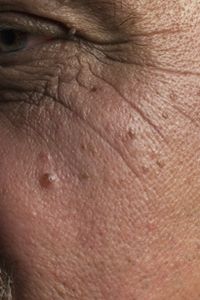Most people are probably aware that the skin is an organ -- the largest one on the body. Because of this distinction, skin is susceptible to cancer, just like your lungs, stomach, brain, breasts and prostate. While it's not as deadly as other cancers, skin cancer kills almost 12,000 people each year and there were more than 68,000 new cases of melanoma skin cancer (the deadliest) reported in 2009 [source: American Cancer Society]. Non-melanoma skin cancers are mostly located in the areas that aren't exposed to the sun. Melanoma skin cancers are almost always due to sun exposure, which is why sunblock is an essential item for anyone who yearns to spend extended amounts of time outside.
Skin cancer is the most common kind of cancer, but even the most deadly melanoma kind is almost always curable if it's caught early enough. There are nearly 1 million cases of non-melanoma skin cancer found each year in the United States alone [source: American Cancer Society]. You're at risk for skin cancer if you spend prolonged amounts of time in the sun without taking proper precautions to cover up or use sunblock. You're also more at risk if it runs in your family or if you have a fair complexion. Another reason to watch out for skin cancer is if you've had severe sunburn at any point in your childhood.
Advertisement
So should you worry about every odd mole or splotch that turns up on your shoulder? Do you need to freak out when you freckle more than usual in the summer time? Lucky for you, your dermatologist has the answers to these questions. A visit to check out something new on your skin is always a good idea, but is it enough to detect an impending skin cancer? Read on to find out just how often you should visit your dermatologist.


